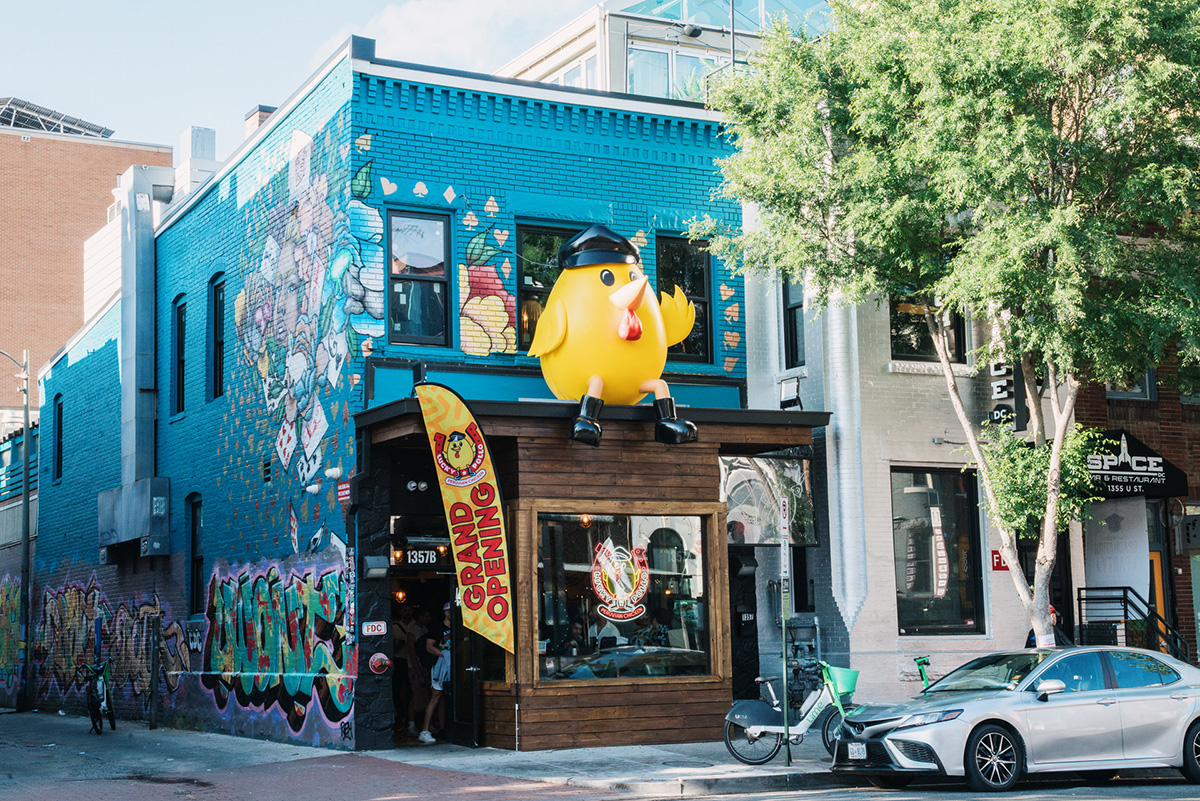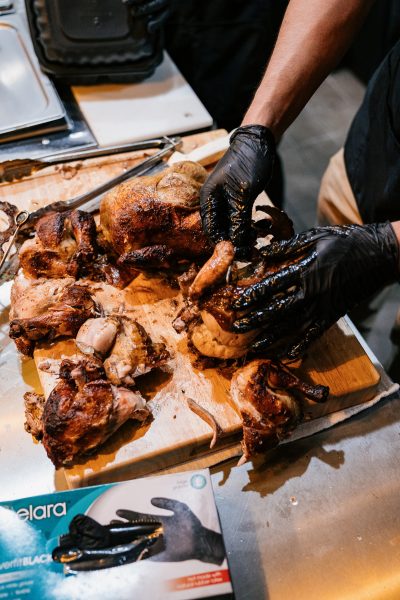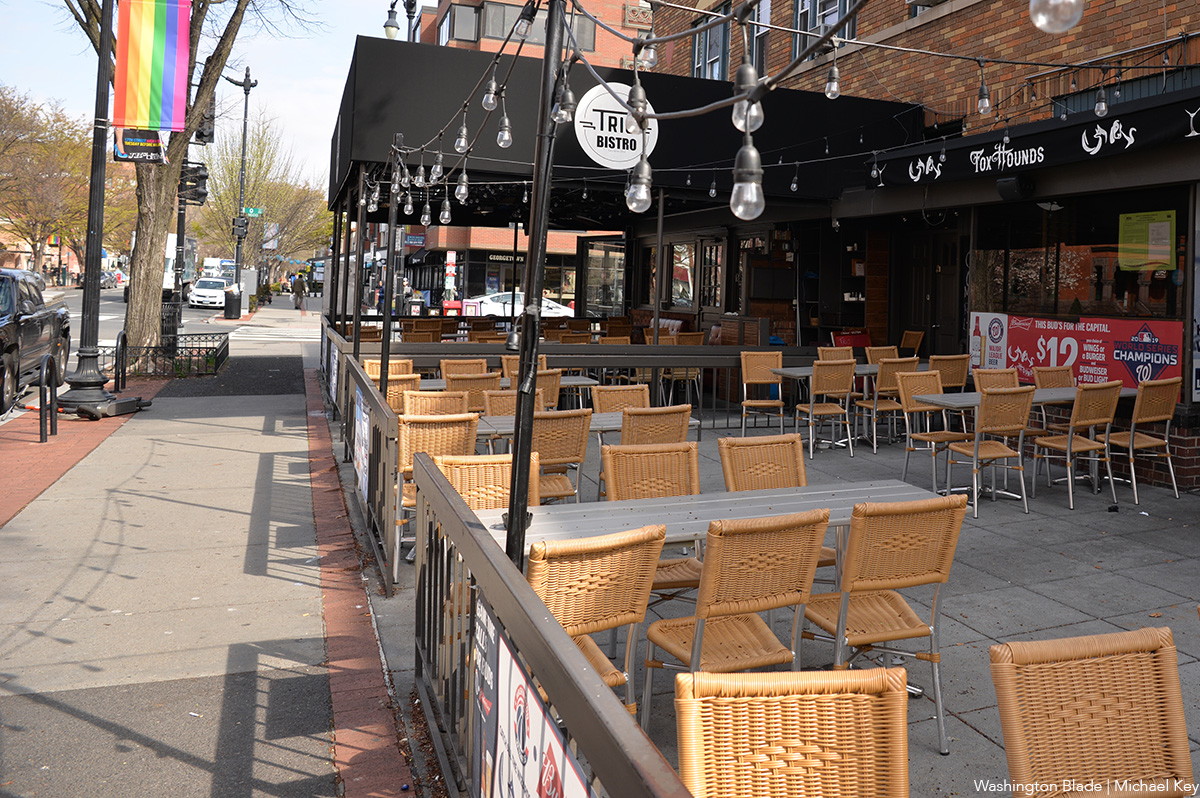Dining
Lucky Pollo stretches its wings at 14th and U
Come for the chicken, stay for the cock

In some fowl fiction foreshadowing, a gay-owned chicken joint has come home to roost on U Street, taking a page from the chicken window subplot on the HBO show “Looking.”
Last Friday, Lucky Pollo – much more than just a takeout window – stretched its wings atop the busy nightlife corner of 14th and U Streets NW.
Behind the poultry production place is Zach Renovátes, a D.C.-based nightlife operator and managing partner of LGBTQ venues Bunker and District Eagle, as well as the LGBTQ event production company KINETIC Presents.
Renovátes opened Bunker in February 2023 and District Eagle in January of this year. Lucky Pollo is the third in his growing gay empire, though this time there are noshes.
“Lucky Pollo was meant to be fun and a little provocative,” Renovátes said.
Based around its Peruvian-style rotisserie chicken, Lucky Pollo is a quick-service restaurant boasting a small menu of poultry and sides. Renovátes says that the dishes are deeply rooted in Peruvian culinary tradition, “a playful experience alongside seriously good food.”
Lucky Pollo’s signature chicken is steeped in a dozen-plus-spice marinade for 24 hours. The meat is then slow-roasted, rotisserie-style, over oak-wood charcoal. Chicken options include quarter, half, and whole.
Helming the kitchen at Lucky Pollo is Chef Luis Herrera, who brings Peruvian recipes passed down through three generations, including his grandmother Laura’s original creations.

Beyond the full bird, the menu features Peruvian-inspired sides like yuca fries (“I personally love these,” says Renovátes) and fried plantains, as well as comfort classics such as mac and cheese and mashed potatoes, and bowls, wraps, and salads. Herrera oversees development of the multiple sauces (including staff favorite, the “secret green sauce”), crafted in-house using traditional Peruvian ingredients.
Lucky Pollo, in its streetside perch, is an independent concept from District Eagle, open to the public and staying open late (3 a.m. on weekends) to serve both nightlife guests and the wider U Street crowd hungry for late-night bites. However, just beyond the kitchen, tucked in the back lies a vintage 1950s candy machine—labeled “Out of Order,” which serves as the door leading to subterranean District Eagle.
Renovátes notes that when District Eagle is open, security staff will maintain a strict two-line policy, ensuring that those seeking meat to eat will not get entwined with those looking to gain access to District Eagle.
Lucky Pollo unites the need for sustenance with the idea of a bit of fortune, given its motto, “Get Lucky” and the whimsical brand mascot: a leather-booted chicken perched on a horseshoe. Renovátes and his District Eagle business partner had always been interested in opening a restaurant, and the Lucky Pollo space was indeed lucky: It already came with a functional kitchen. Plus, he says, the nearby fast-casual places around 14th and U streets “don’t offer a lot of quality options,” so opening the chicken spot “was a no-brainer.”
The space, designed by NYC creative Jasin Cadic, blends theatrical street-art-style vibes with Keith Haring-inspired wall prints, neon signs, and ceiling-hung chicken figurines —”some edgy, some sweet,” says Renovátes —creating an immersive, playful atmosphere. Lucky Pollo and District Eagle maintain separate amenities for their respective customers.
Lucky Pollo opened last week with a competition to devour a whole rotisserie chicken in the fastest time, with the winner earning $1,000 and a framed spot on the restaurant’s “Wall of Fame.” The opening also featured other games and prizes, and a full crowd spilling out the door.
“We want it to be a great place to eat, but also serve as a playful front for something completely unexpected.” Renovátes says.
On weekends especially, he jokes, the motto will be, ‘Come for the chicken, stay for the cock.’”
Dining
Spark Social House to start serving alcohol
D.C.’s only ‘LGBTQ alcohol-free bar’ changes course

Washington, D.C.’s only LGBTQ alcohol-free bar will lose that distinction in December: Spark Social House, located at the corner of 14th and U streets, N.W., will no longer serve only booze-free drinks.
Spark Social, as it is commonly known, received significant media attention and accolades when it debuted in March. Opening in the beating heart of the LGBTQ community’s social scene, its doors stand next to other popular nightlife establishments, including Crush, Bunker, District Eagle, and Revolt (which opened after Spark Social). All of those other bars serve alcohol.
Spark maintained a separate identity, creating a “third space” for sober guests or those who did not wish to spend their evening in an alcohol-forward space. Owner Nick Tsusaki, a former bartender, opened Spark Social to fill a gap he saw in queer nightlife establishments that centered drinking. Instead, Spark was intended to be a convening bar. By day, it has served coffee and tea as a café for remote workers, meetings, and catch-ups. In the evening, the bar hosts a wide array of events, with DJs, dancing, drag queens, speakers, open mic nights, and stand-up comedy, movie showings, among other events.
At the bar, it served cans, bottles, and craft cocktails, as well as “wellness drinks” or functional beverages like mushroom elixirs, Kava, and kombucha. All of these are currently non-alcoholic. Currently, in November, the bar is serving seasonal morning drinks like toasted almond and French Toast lattes, plus non-alcoholic cocktails like a “Hottie Hottie” with non-alcoholic spiced rum, lemon, and maple butter; plus a maple espresso “martini” without liquor, which includes mushroom tinctures.
Spark Social, even in its short time in existence, won “Best DC Coffee Shop” in the 2025 Washington Blade annual poll.
Nevertheless, in early November, the Spark owners and leadership team hosted a town hall to share updates and hear directly from the community about the next chapter for Spark.
According to the bar’s Instagram posts, the town hall reviewed the intent and purpose behind the bar: to create a queer third space where people can connect, create, and feel at home.”
“After eight months as a fully non-alcoholic bar, we’ve learned that sobriety exists on a spectrum and inclusion means offering choice.”
To that end, in December, Spark’s offerings will evolve. Instead of serving only drinks without alcohol, there will be a new “1 for 1” menu in which every cocktail comes in two versions: booze and boozeless. While alcohol will be served, the bar owners insist that they remain committed to maintaining its welcoming and relaxed vibe.
In a separate post, Spark wrote that “Although this was not our intent when we started the business, after 6 months of operations we’ve made the difficult decision to change our business model so that we can keep providing this space to the community.”
They acknowledged that this pivot might have “come as a surprise,” and offered to received feedback to ensure that the bar’s initial objective of being a unique space could continue.
Alcohol will only be served at the bar in the evenings during the week, and all day during the weekend.
Tsusaki spoke to the Blade about the changes and offered these statements:
“When we opened, the goal was to create a queer third space where people could spark a connection, spark creativity, spark an idea — especially for folks looking for an alternative to the typical drinking environment,” Tsusaki said. “From day one, Spark has been about the vibe — a place where you can just exist, feel at home, and be surrounded by community without pressure or pretense. After eight months as a fully non-alcoholic space, we learned a lot about what people actually want from spaces like this. Most folks exist somewhere on a spectrum of sobriety — some are fully sober, some are sober-curious, some drink occasionally. We realized that if our mission is to bring people together, inclusion has to mean options for everyone.
“We had to face the financial reality of running a small independent space in D.C. The city has been hit hard — especially with reduced spending and recent federal layoffs — and it’s made things tough for hospitality businesses like ours. Adding alcohol helps make Spark sustainable so we can keep doing what we do: building community, creating jobs, and keeping this space alive for the long haul.
“We’re using this moment to make the space even better — enclosing the back patio so it’s usable year-round, upgrading our DJ booth and sound system, and making a few design tweaks that better reflect the energy and creativity Spark has always had.”
Dining
Trio, Fox and Hounds to close with Nov. 2 goodbye party
Owner unable to extend lease after 75 years on 17th Street

For 75 years, along the 17th Street corridor that has long been a bastion of LGBTQ social and cultural life, Trio Bistro and Fox and Hounds Lounge have served customers. On Nov. 2, these two mainstays will close their doors.
Owner Mourad Menjelloun wrote that, “For decades, Trio has been more than just a restaurant; it has been a second home for so many of us, both for our guests and our dedicated staff. Our team is a family, and many have spent decades building the connections and community that made Trio so special.”
Although the owner was not gay, both businesses became a safe space for many LGBTQ locals, similar to Annie’s Paramount Steak House, also located on 17th Street. Many LGBTQ social and professional groups used Trio as a meeting place to plan activities and hold events.
Trio Bistro and Fox and Hounds share a kitchen, though they have two separate dining areas. Trio, located on the corner of 17th and Q streets, N.W., is known for its diner-style fare and huge red-and-green neon sign advertising “good food” above the door. With two covered patios wrapping around on both streets, Trio was known for its burgers, steaks, pasta, and other all-American entrees. It was also well-known for brunch, bringing in social sports teams, longtime friends, and groups discussing the previous night’s activities.
Fox and Hounds, right next door, was a more relaxed, bar-focused space. Its large, social patio attracted those who live in the neighborhood and people from outside, for the long happy hour, the people watching, and the casual atmosphere. Customers especially were drawn to the digital jukebox and 80-inch TVs.
The local blog Prince of Petworth posted a short history of Trio, which opened in 1950 by a couple, Pete and Helen Doukas.
In an email, Menjelloun stated that “After three decades of my own life poured into this place, and having shared the news with our loyal customers and neighbors, I can tell you that this decision was not made lightly. Unfortunately, we were unable to extend our lease.” He also noted that a significant number of employees had been with the restaurants for more than a decade, including one waitress who was part of the team for more than 30 years. He set up a GoFundMe to support the staff once the restaurant closes.
In the face of the sudden closure, there will be a goodbye party on Nov. 2, 5 p.m.-12 a.m. for one final gathering.
“As we prepare to close, we are filled with gratitude for the memories, celebrations, and everyday moments you have shared with us. Thank you for making Trio a part of your lives. We will cherish the relationships we have built forever,” Menjelloun stated.
Dining
Chefs for Equality undergoes dramatic reimagining
This year’s event will take place at five different restaurants

In a time of uncertainty, coming together in unity and solidarity is especially important —and along shared tables over bountiful meals even more so. In light of the national mood and local political climate, the Human Rights Campaign has announced its signature Chefs for Equality (CFE), the region’s largest and most star-studded culinary event supporting LGBTQ rights and equality — but with a dramatic reimagining. This year’s edition (the 13th), dubbed Everything Everywhere All at Once, takes place Monday, Oct. 27, at five restaurants across D.C.
Fresh off last year’s CFE event at the National Building Museum, which featured 150 chefs, bakers, mixologists, sommeliers, and restaurateurs across 50 savory and 20 dessert stations, CFE 2025 is going back to its roots and recognizing the deep importance of community with a format that centers restaurants: five exclusive collaborative dinners hosted by some of the DMV’s most celebrated chefs, mixologists, and restaurateurs.
“Chefs for Equality shines a spotlight on the strength and solidarity of the DMV’s vibrant restaurant scene,” says esteemed writer David Hagedorn, the gala’s creator and chair. “This new format is a powerful expression of the resilience and inventive spirit that celebrates culinary excellence while championing equality.”
Hagedorn, a longtime leader of the LGBTQ food community in Washington, D.C., says that given the challenging economic environment in the city, the organizers were looking to scale back the event, and realized that by having dinners at restaurants, they would still be able to collaborate and raise money for the HRC Foundation, as well as “redouble our efforts as a restaurant community to stand up for equality, especially when the government is intent on taking away rights for which LGBTQ and other marginalized people have fought long and hard.”
Each of the five dinners follows the same format: beginning with an extravagant cocktail reception, followed by a multi-course paired dinner and dessert.
New this year as well is an even more open format: everyone in D.C. could participate outside the dinners. From Oct. 27–Nov. 2, select restaurants and bars around the DMV will participate in “Chefs for Equality Promotional Week,” offering specials and donating a portion of those sales to the HRC Foundation. While the dinners take place on just one night, the promotional week signifies that restaurants across town can show their support for equality in a diversity of ways.
HRC Foundation President Kelley Robinson added that, “Food has always been a great unifier — it brings people together across differences and reminds us of our shared humanity. That’s why we are thrilled to once again partner with DC’s culinary leaders. We believe in a world where all LGBTQ+ people feel safe and able to be their authentic selves wherever they show up in their daily lives.”
“It’s an honor to chair this event,’ Hagedorn said. “I’ve been in Washington since 1976, so I’ve lived through the AIDS years. Chefs for Equality was created in 2012 as a one-off to raise some money for the marriage equality push that was on the ballot in Maryland. The lesson I learned in the trenches is that our rights can never be taken for granted.”
Chef and co-owner Johanna Hellrigl, of Northern Italian restaurant Ama, has supported Chefs for Equality and the HRC Foundation for many years. She will be at the Duck and the Peach dinner’s opening course, featuring Ligurian Fügassa Focaccia, among other bread items. “I think that the events taking place at restaurants instead of at a venue this year showcases how supportive restaurants are of the community — no matter what obstacle stands in the way, we will find a way to come together and make it happen. It’s a time to spread some love.”
The five collaborative dinners are as follows. Each dinner will include an auction, Chefs for Equality’s signature goody bags, florals by Amaryllis Design House and other surprises.
CUT by Wolfgang Puck – Host Chef Wolfgang Puck in collaboration with Chefs Andrew Ho and Ligia Barros (CUT), Amy Brandwein (Centrolina), Harley Peet (Bas Rouge), and Bryan Voltaggio (Wye Oak Tavern)
Moon Rabbit – Host Chefs Kevin Tien and Susan Bae, in collaboration with Chefs Rob Rubba (Oyster Oyster), Ryan Ratino (Bresca, Jont) and Ellin Yin (a.kitchen+bar), Satang Ruangsangwatana and Prapavadee Limvatana (Six Ways to Sunday), Seng Luangrath (Baan Mae), and Paolo Dungca (Kaya)
The Duck and the Peach – Host Chefs Katarina Petonito and Rochelle Cooper in collaboration with Chefs Johanna Hellrigl (Ama), Matt Adler (Caruso’s Grocery), Carlos Delgado (Causa), Jova Urriolla (Colada Shop), Mike Friedman and Robert Cain (Red Hen), Simon Lam (Tiger Fork), Ria Montes (Fish Shop Bar & Restaurant), and Kareem Queeman (Mr. Bake)
Acqua Bistecca – Host Chef Colin Clark in collaboration with Chefs Tatiana Mora and Miguel Guerra (MITA), Ruben Garcia (Casa Teresa), Tony Chittum (Iron Gate, Vermillion), Matt Conroy and Isabel Coss (Pascual) and Scott Drewno (Fried Rice Collective)
Perry’s – Host Chef Masako Morishita in collaboration with Audrey Angeles (Forst & Flourish) and David Guas (Neutral Ground). Perry’s has a unique format: it will present “Drag Brunch for Dinner,” a lavish buffet curated by James Beard Award-winning chef Morisita with performances by several of D.C.’s top drag superstars.
-

 Mexico5 days ago
Mexico5 days agoUS Embassy in Mexico issues shelter in place order for Puerto Vallarta
-

 Real Estate5 days ago
Real Estate5 days ago2026: prices, pace, and winter weather
-

 Theater5 days ago
Theater5 days agoJosé Zayas brings ‘The House of Bernarda Alba’ to GALA Hispanic Theatre
-

 Netherlands4 days ago
Netherlands4 days agoRob Jetten becomes first gay Dutch prime minister




















